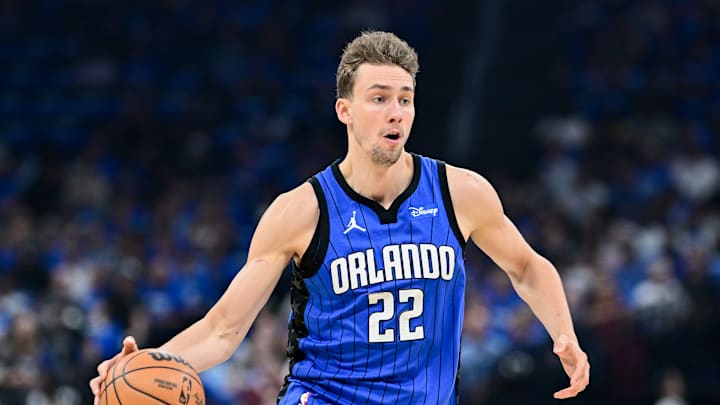The Orlando Magic just returned to the playoffs after a three-year absence. In those three years, they build a talented young roster through the draft. Jalen Suggs, Franz Wagner, and Paolo Banchero were all high lottery picks developed in the Magic's system.
Developing young talent and building a playoff roster that way is the dream for many teams, and now the bill for the Magic's homegrown roster is coming due. 2021 lottery picks Jalen Suggs and Franz Wagner are up for extensions, and the Magic need to figure out what to do with them.
Paolo Banchero is due for his extension next year, but that one is much easier. He will get a max contract. Suggs and Wagner are a little more tricky.
The Magic cannot afford to overpay Franz Wagner
Extending anyone who is not a clear-cut max player but still a high-level talent is difficult. That is where the Magic are with Franz Wagner. He is currently the team's second option and Banchero's co-star. His talent and potential is not in question. The question is what the Magic should pay him for that talent.
Some fans would understandably be content with giving Wagner a max extension if it ensures him staying in Orlando long-term, but that could be a costly mistake. It would hamstring the Magic's financial flexibility for years and limit their options to make significant moves in the future.
Out of the 2020 draft class, four players secured rookie extensions for over $200 million for five years. Anthony Edwards, LaMelo Ball, and Tyrese Haliburton all got five years for $260 million, while Desmond Bane got five years for $207 million. Bane is the outlier here as the only player who has not made an All-Star team yet.
The other three are all better players than Wagner at this point of his career, though. LaMelo Ball has been dealing with frequent injuries but is still largely viewed as a franchise-level player when healthy.
Next on the list of 2020 rookie extensions are Devin Vassell and Jaden McDaniels. Vassell got five years for $146 million and McDaniels five years for $136 million. Wagner might end up being a better player than both eventually, but right now this seems like the kind of price range he should fall into.
Wagner has great potential as a playmaking two-way wing, but he still has work to do. Especially his shooting has been worrisome this season. He was not a great three-point shooter in his first two seasons either, but this year, his percentage plummeted to 28.1 percent on 4.6 three-point attempts per game. For a team that already struggled to stretch the floor, that was tough to deal with.
In the playoffs, Wagner didn't put together his best showing either. If your second-best player goes 1-15 from the field in a Game 7, it is hard to win or put together a coherent offense. Over seven games, Wagner shot less than 30 percent from the field three times and only shot better than 33.3 percent from three twice.
Now, the question is whether his struggles were a first sign of him being more of a third option in the big moments or if the pressure of his first playoff run was just too much to handle. After all, he did put together a huge game in the Magic's second home win of the series and played well in Game 5.
The Magic will know the answer to that question soon enough, and either way, they cannot afford to overpay him. In his offseason guide for the Magic, Bobby Marks noted that he would not have pegged Wagner as a max player even before his struggles in the playoffs. Rather, he expects him to get around $25-26 million per year.
